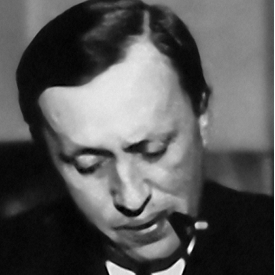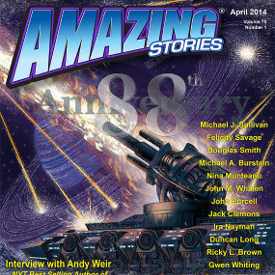Science Fiction fans have long been enamored (we’ll use that word for now) of puns and other forms of wordplay. From Ackerman and Gernsback’s fondness for making up words (Horrorwood, Scientifiction) to Star Trek’s technobabble, wordplay has found a receptive audience within our ranks. And as we all know, a good pun is its own re-word.
Far too many years ago, Reginald Bretnor raised the art of the literary pun to new lows with his introduction of the adventures of Ferdinand Feghoot. These short groaners appeared under the pseudonym Grendel Briarton, an anagram for Bretnor (more word play). The stories appeared in the Magazine of Fantasy and Science Fiction, Venture and Isaac Asimov’s Science Fiction magazine under the title Through Time and Space with Ferdinand Feghoot and were eventually collected in a now hard to find volume The Complete Ferdinand Feghoot. Many SF authors contributed ideas or even wrote their own, including Asimov (Shah Guido G.) and A. Bertram Chandler (A Knight’s Tale).
A Feghoot is, typically, a short story that beats around the bush, deriving its pleasure by making the reader (or listener) hang on through largely pointless detail, waiting for a payoff. It is almost always based on a fractured folk saying or well-worn cliche. The payoff for a successful Feghoot ALWAYS elicits a groan.
Be Warned. Feghoots always end with a groan.

With a loud sigh of relief, Carl Anderssen cut the primary landing engines of the USS Storm, checking over the controls of the supply freighter, making sure all was in order before throttling down the stabilizer engines. The ship shook as pad clamps latched into place and a green light came on. “Agrippa base, Storm is down and secure,” Anderssen said as calmly as he could, wiped a drop of sweat off his upper lip.
“Copy that,” came the reply. “Glad you made it, Anderssen. Good piloting there.”
“Thank you. I didn’t expect to have to come in like that. Request permission to inspect the store, make sure that everything survived in one piece before unloading.”
“Granted. Just holler when you’re ready and we’ll roll out the unloaders.”
“Will do.” Anderssen cut the com, turned and smiled at his copilot, Wes Highfield, who was mopping color back into his face with a towelette. “Hey, we’re here, buddy. No problem. You can start breathing again.”
Highfield shook his head and wanly smiled back. “You damned near made me puke rolling the ship like that. Sheesh, but that was way too close. Where the hell did that flyer come from?”
“It certainly wasn’t a manned flyer,” Anderssen said, punching out the sequence to turn the storage compartment’s cameras on, then do 180-degree up and down sweeps over the contents. Nothing looked amiss just yet: the way NASA packed and strapped in these supply payload runs to its lunar mining settlements, it would take practically a direct hit from an asteroid to knock anything loose. “It flew too erratically. Betcha it was a security drone from Musk Abode, remote controlled. It was way too small to hold anybody, unless it was a munchkin,” he offered as explanation.
Highfield grunted. “Well, it was big enough to put a dent in our ship if it hit us! Whoever was controlling it sure as hell wasn’t paying attention or watching where it was going. I’m just glad we were able to see it first and get out of the way. That damned thing was heading directly for our starboard side.”
Anderssen nodded. “Yeah, and pretty fast, too. That’s what makes me think it was somebody’s private security drone, taking pictures for posterity, or some such nonsense. These mining operations up here are still relatively new, you know. With new miners and engineers arriving all the time, it wouldn’t surprise me that some idiot newbie thought it would be a good idea to record any incoming/outgoing ships for his grandkids. Thing is, it’s a lot trickier to fly a drone on the moon than in your backyard on Earth. I mean, first off the Musk Abode dome is hidden by the ridge at the top of crater Agrippa. If you can’t see what you’re doing, you’ve got problems right there. Then add in the lesser gravity, and any acceleration is going to be amplified, and don’t forget cameras don’t help much here: surface distances are very hard to judge with no atmosphere getting in the way. What looks only a mile away could easily be fifty miles off. So if you’re piloting one of those things for the first time here, you had better have insured your toy. It would be very easy to crash it into something. Like us.” Anderssen said all this like a high school science teacher, all the while watching the storage compartment screens. So far he had seen no content damage. That was good. Very good. They would still get a full paycheck.
Considering the quick vertical roll up and backwards he had been forced to make, Anderssen and Highfield were lucky to be alive. After their near miss, that drone had flown straight and true back towards the crater’s landing complex while Anderssen took the Storm back around over the Sea of Vapors to turn right side up, slowed to hover a few minutes, watched the drone intently as it drifted across the crater, then up and out in the direction of Musk. By then Anderssen’s heart had started beating normally again, which was when he took the freighter in for its final approach and landed without incident. He made a mental note to check their liquid O2 levels. That fast burn he made surely ate up a sizeable amount.
“Well,” began Highfield, “all I can say is after an approach like that, I need a drink. What have we got on hand on this barge?”
Anderssen thought a moment, said, “I’m not sure. It’s been a while since the crew liquor cabinet’s been stocked. Go down to the galley and check the far right compartment from the microwave.”
Highfield rotated the copilot’s couch upright, unhitched himself, and started climbing down the rungs that lead first to their quarters, then the galley, followed by what passes for a space-faring bathroom (complete with a sort of shower) before the crew module ended. The cargo module – all thirty-five feet of it – was next. At the end of all that, properly separated from crew and cargo, came the business end of the freighter: fuel tanks, engines, and so on. Highfield stopped in the galley and unlatched the door to the compartment three sections over from the microwave. He peered inside and started sliding bottles out of their individual bubble-wraps, which were stacked in an aluminum lattice rack, and started reading off labels: “Taylor’s, Napa Valley…”
“Is there any whiskey?” Anderssen asked. “I could use a belt of that.”
“Nope,” Highfield called back. The sound of bottles clanking resumed. “All I’m seeing in here is wine. Not even a single bottle of beer! Who the hell flew this barge last?”
“I think that was Captain Dickson. She’s a damned good astronaut with a long record of commercial flights to the European Space Station and supply runs out here.” Anderssen laughed. “Figures that she’d be a wine drinker. Me, I like Beam or Jack Daniels.”
“Same here. But I’m more of a beer drinker.” More clinking. “Well, there’s sherry, sangria, tawny port, Colheita, Rose, white port..ga..uh, garra-fie-rah, I think…”
“That’s Garrafeira, Wes,” Anderssen said. “It’s a variety of port wine. Tastes a little bit like bacon.”
“Seriously?” Highfield sounded incredulous. “Whoever heard of bacon-flavored wine?”
Laughing, Anderssen said, “Everything’s better with bacon. Bring it on up. And don’t forget a couple glasses.”
“Seriously?”
“Sure. I’ll drink it. Any Port in a Storm.”
A professor of English and ESOL (teaching English to Speakers of Other Languages) at Blinn College in Bryan, Texas, John Purcell has also been at various times in his life an insurance assistant underwriter, worked at a pig-packing plant in Iowa, and a professional jazz musician. John gave that last one up for teaching because he needed a steady paycheck to take care of a growing family. Yes, he is married – for 23 years now – and has three children, all grown. Well, almost; the youngest is 17 and still living at home, but as soon as that kid is done with college and gets a job, he gets the boot.
John currently publishes the online fanzine Askance, which is available for viewing and downloading at www.efanzines.com, and has been involved with science fiction fandom in one way or another for 40 years now. He is hosting the fanzine lounge at the upcoming World Science Fiction Convention in San Antonio, Texas – LoneStarCon 3 – and is looking forward to attending his first world con since 1978!









Recent Comments